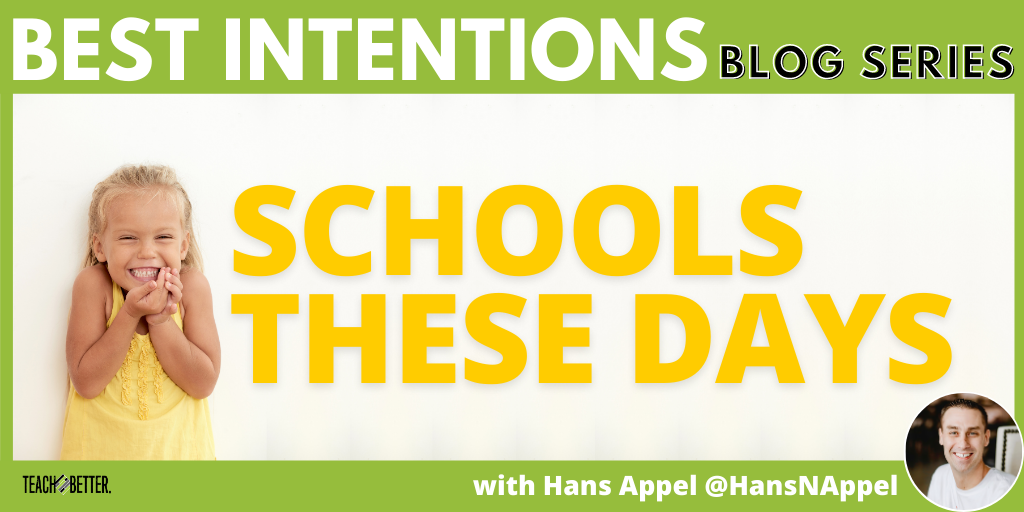TL;DR:
- Hans shares a story about how his puppy, Winnie, was demonstrating deregulated behavior on a walk. Remembering his recent conversation with Dr. Carrington, she said we need “connection before direction.” 5 keys to reconnecting are listed below.
- Relationships and reconnection starts and ends with the adults in our schools. Children need adults to show them how to regulate when they become distressed.
- Schools these days need teachers who are emotionally regulated, willing to walk learners home, and understand self-care is a daily practice.
- As adults, we can show up wholeheartedly each day. Put our best intentions forward.
“We’re all just walking each other home.”
– Ram Dass
Today I took a dog walk and learned how to be a better version of myself. I know that sounds slightly outlandish, but that’s what happened.
I got up early, bundled up, and took Winnie and Maya for a nice long walk. It started off as any normal morning. Perhaps the one slight exception is that my wife, Jennifer, stayed home as she wasn’t feeling well. But otherwise, it was business as usual.

Five minutes into the walk and my puppy, Winnie, was struggling. She was all over the place. Biting at the leash, walking out into the street, and sitting down, refusing to walk. It was behavior she’d outgrown months ago; yet, somehow this morning we found ourselves transported back to a younger more deregulated self.
Schools these days need teachers who are emotionally regulated, willing to walk learners home to their upstairs brain, and who understand self-care isn’t a Saturday event, but rather, a daily practice. Click To Tweet
The word “WE” is intentional here as my patience waned with each passing moment. My frustration grew as my strict time schedule was being pulled and stretched like the leash I was holding. Harnessing my best counselor voice, I tried to gently coax her along before giving way to attempts with power and authority. As my grip on the leash tightened so did Winnie’s resolve to go home. In a sudden flash, I found myself thinking back to Sunday’s Best Intentions conversation with Dr. Jody Carrington.
Schools These Days – Reconnecting
This past week, Dr. Carrington, author of Kids These Days, broke down the importance of emotional regulation. She explained that kids truly learn regulation when they’re not regulated. In other words, all the well-intended lessons and strategies that we teach our learners go out the window when they’re in their downstairs brain.
“You can talk all day long with a calm kid about what they’re going to do when they lose their mind, but they will forget those strategies when they become distressed. They will need to rely on you, and other big people in their world, to show them how to do it.”
Winnie is a great dog and proved she’s capable of being a wonderful walking partner many times. But today, in this chaos of feeling out of control, all her puppy training went out the window. Dr. Carrington writes that we need “connection before direction” and that there are 5 keys to reconnecting:
- Show genuine interest in things they care about first.
- Get their eyes and say their name.
- Get down on their level.
- Feed them and they will come.
- Never leave them—proximity matters—especially when they tell you to go.
Respond with Intentionality
Reflecting back on Dr. Carrington’s powerful words, I took her advice and channeled my best intentions.
I sat down on the sidewalk, turning my headlamp off so I could make eye contact with Winnie. Sitting cross-legged with my bright orange coat in the pitch dark must’ve looked like a complete show to any passerbys. However, I needed a way to calm both myself and Winnie. I lovingly pet her very softly and took a few deep breaths while getting present with myself. Talking to her, I could feel the tension release from Winnie, the leash, and myself.
I’d like to report that I hopped up off the sidewalk and we sauntered home. But the truth is, it took 2 more times of stopping, getting down on Winnie’s level, and lovingly encouraging her to keep walking.
After making a few intentional stops along the way, Winnie and I did great on the second half of the walk. She happily wagged her tail the whole way home.
Shifting my attention back over to her sister seemed to prove equally important. I noticed that my other Award Winning Dog, Maya, had switched from passively trotting on the far edge of the sidewalk to proudly prancing in the middle with her sister. As any good teacher will tell you, the entire class is impacted when the teacher goes off on a single student. They might be quiet and well-behaved but their learning, emotional safety, and joy are damaged.
All kids are watching how you handle that one kid.
A path that normally takes 50 minutes to walk took over 65 minutes. Teachers with a finite mindset staring at a blown up pacing chart would have lost their minds over me deviating from the traditional time frame. On a day where I was already running late, I had no bandwidth for a walk that would stretch long.
Still, that’s what we do every day—meet kids where they’re at. Somedays, you throw out the lesson plan for review day, morning huddle up, or some other deviation from the path. Sometimes the best thing we teach our learners has nothing to do with academic content.
Kids These Days Need Schools These Days Led by Teachers These Days.
Slowly making our way home, I began to imagine what others might have said…
My administrative friends would have been quick to observe Winnie’s behavior on a morning with high winds and full moon. As amateur meteorologists, educational leaders know that any change in weather seems to result in a change in student behavior.
Trauma experts might point out that Winnie’s high ACES background meant she was wired for challenging days like this. A trauma-invested approach, before and during the walk would have aided our efforts.
Caesar Milan might have noticed that I wasn’t harnessing my inner pack leader so negative energy went right down that pink leash and into Winnie’s behavior. When we’re out of control, so are they.
Brene Brown might have reminded me that I was vulnerable to coming undone today as my internal sadness about my wife’s cancer manifested itself into anger on my sweet little dog. New Challenges can weigh heavy on our hearts and in turn impact how we behave. Managing others’ emotions begins by recognizing our own.
[scroll down to keep reading]
Dr. Carrington might have given me a hug as she reinforced:
Relationships and reconnection starts and ends with the adults in our schools.
Schools these days need teachers who:
- are emotionally regulated.
- are willing to walk learners home to their upstairs brain.
- understand self-care isn’t a Saturday event, but rather, a daily practice.
Here’s the thing about…well, life. There’s no guarantee that tomorrow’s dog walk will be smooth sailing. But the confidence Winnie and I have in our ability to resiliently regulate ourselves in a tornado of emotions is stronger. All we can do is show up wholeheartedly each day, driven to put our best intentions forward. And if we lose sight of the path again, it’s my job to walk her home.
Regulate Better. Teach Better.
Join us May 23rd at 8 p.m (EST) on our Teach Better Team Private Facebook group and learn how to put your Best Intentions into action to dramatically impact your learners!
About Hans Appel
Hans Appel is an educator, speaker, and writer deeply committed to inspiring the whole child. He’s the author of, Award Winning Culture: Building School-Wide Intentionality and Action Through Character, Excellence, and Community. Additionally, he’s the Director of Culture for the Teach Better Team, co-host of the Award Winning Culture podcast, and the Co-Creator of Award Winning Culture.
Hans is also a member of the Teach Better Speakers Network.




